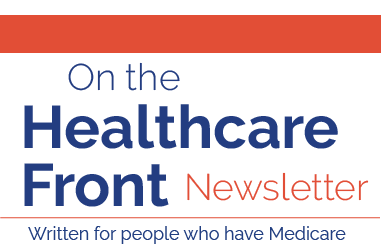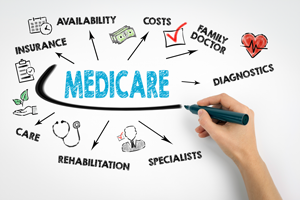
|
Issue #29 September 2024 Newsletter issues will tell you about Acentra Health’s free services for people who have Medicare. They also contain important information from Medicare and other health-related tips. Do you receive email reminders when new issues of On the Healthcare Front are published? |
when should you call acentra health?
- If you are not ready to be discharged from the hospital.
- If your Medicare skilled services are ending too soon. Examples of skilled services include things like physical therapy and nursing services.
- If you have a concern about the quality of care you received.
- If you have a concern about your medical care that needs to be taken care of right away.
To learn more about our free services, you can watch a video or read more on our Overview of Services for People who Have Medicare page on our website.
Click on the button below for the phone number for your state. These services are free for people who have Medicare.
september is healthy aging month
The focus of September's Healthy Aging Month is to inspire adults to improve their overall health and well-being. And there is a great deal of information to help you do just that.
Take a look at our Healthy Aging page for details.

it's time for medicare openenrollment!
Medicare Open Enrollment is from October 15 through December 7. Our next newsletter issue will include detailed information about Medicare Open Enrollment.
If you don't receive the newsletter - On the Healthcare Front - in your email inbox, sign up now for free.
do you know someone who might enjoy this newsletter?
Pass along this link to your friends so they can read the newsletter published by Acentra Health — On the Healthcare Front — and how to sign up.
Here is the link you can copy and share with friends: www.acentraqio.com/ohf
in this issue:
communicationhospital discharge planning |
health observancemedicare and open enrollment |
communicating effectively with your healthcare providers

Knowing the ins and outs of the healthcare system can be challenging, especially if you are dealing with a new illness, a chronic condition, or caring for a loved one. Learning how to talk with your healthcare providers is important to get the best possible care.
This article contains tips to help you communicate better with your doctors, nurses, and other healthcare practitioners who provide your care.
be prepared for appointments
Peace of mind comes with being prepared. Before any doctor visits, it may help to make a list to allow you to focus on the things you want to talk about. There can be a lot of things to cover during a visit, and a list can help you make the best use of your time.
- For example, you could make a list of your symptoms. Sometimes, anxiety can cause you to forget some important details. Your doctor wants to know them all so that you can be given the best care.
- You may want to include a question about any preventive services that your doctor wants you to consider, such as immunizations and screenings.
- New aches and pains that simply won’t go away should be highlighted during your exam. Nothing is too small! Read this article from our August issue for more information about pain: Pain Doesn’t Have to be a Normal Part of Aging.
- Write down your medications. These include prescription and any over-the-counter medications, such as vitamins and supplements along with dosage information. If it is easier, simply take a picture of your medicine bottles. All of your doctors must know what you are taking to prevent any kind of drug interactions and to continue with a good treatment plan for you.
What happens if you don’t know what questions to put on your list? Maybe you were recently diagnosed with a new illness or condition. You could talk with friends or family members who have the same illness or condition. They can guide you about what to bring up during your appointment.
If you’re on social media, such as Facebook, you can join a group! Thankfully, there are groups for just about everything. With today’s technology, you can talk to others with the same illness or condition. You can inquire about good questions to ask. You can also read others’ experiences and discover how others may see things.
A random piece of paper, the back of a receipt, or a typed-out list on your smartphone – it doesn’t matter what you use to record your list. Just make sure you have it in some form when you go to your doctor for a less stressful experience.
ask questions
A good relationship with your doctor will allow you to be comfortable asking questions, especially when something is unclear.
We have all been on medical visits where the words used to describe your condition aren’t easily understood. Sometimes your doctor talks quickly or doesn’t explain what certain terms mean. If this happens, speak up! Let your doctor know right away if you don’t understand something. To take the right steps in your care, you need to understand your illness or condition. Clear treatment options should be laid out for you as well as any other needed information.
If you feel unsure about a treatment plan or have concerns about a medication, please say something. Your doctor is there to help you, and they need to know how you’re feeling to provide the best care.
If you find that you can’t talk with your doctor or your doctor is always in a rush, it may be time to look for another doctor who will give you the time you need.
take notes
In the moment, you may think that you will remember everything said during an appointment. However, that is often not what happens. Therefore, take notes. If needed, bring those reading glasses! Jot down the important aspects that you will need to refer to later. Asking a family member or friend to go with you to listen (or they could be on the phone) and take notes can also be helpful. Whichever choice you make, just make sure you have a way to reference things later on.
follow up after appointments
You may have more questions after you leave your appointment. If this happens, please don’t hesitate to call your doctor’s office. You need to do your part to stay informed about your health. Keep in mind that doctors are often busy, and it may be difficult to talk with them on the phone. Many doctors’ offices have patient portals that you can use to send messages, including requests for refills for your medications. Ask office staff how you can get started.
|
More Information: The National Institutes of Health has information about Taking Medicines Safely, Ways to Get the Most Out of Your Doctor’s Visit, and Questions to Ask Your Doctor During a Checkup. Visit www.medicare.gov to learn about preventive and screening services that are covered by Medicare. |
are you having a planned surgery?
the importance of understanding hospital discharge planning

If you have any planned surgery that’s coming up or if you have a good friend in the hospital, you should be sure to have a full understanding of the hospital discharge process.
Discharge planning is a critical part of your recovery. It involves preparing for your care after you leave the hospital. This can be different whether you’re going home or to another facility, such as a skilled nursing facility.
Shortly before you leave the hospital, you should meet with a discharge planner. This person will talk with you about leaving the hospital, what to expect, and things you may need.
Here are some things to keep in mind:
- Start Planning Early: Discharge planning should begin as soon as possible after you are admitted to the hospital. Ask your healthcare team (the nurses, therapists, and other practitioners who come into your room to provide care) about what to expect after you leave the hospital. Start thinking about what kind of help (such as home health services and medical equipment) you might need at home.
- Know Your Medications: Before you leave the hospital, make sure you understand any new medications you’ve been prescribed. Know the name, what the medication is for, the dosage, how often you need to take it, and any possible side effects. Ask about any printed material that you can take home for future reference.
- Understand Your Care Instructions: Your doctor or nurse will give you instructions on how to care for yourself at home. This might include things like wound care, food that you shouldn’t eat, or physical therapy. Make sure you understand these instructions and ask questions if anything is not clear. If you have a traditional way of cooking, ask about how you can make the necessary changes to your diet while keeping to your family’s heritage and culture. Ask about the possibility of speaking with a nutritionist or dietician who can provide details about diet and make suggestions as to how you can modify your diet according to what’s best for your condition or illness.
- Arrange for Follow-Up Appointments: Before you leave the hospital, find out when you need to see your doctor again. Try to schedule any follow-up visits before you go home. When you see your doctor(s), especially your primary care physician, share a list of all medications that you take, including any new medications you were prescribed while in the hospital. All your doctors should have a complete list of all medications, both over-the-counter and prescribed medications. If you need a ride to your appointments, you should talk with your discharge planner about free community services where you live and how to access those services.
- Get Support at Home: If you need help at home, such as help with bathing, getting dressed, or cooking, talk with your discharge planner about this before you leave the hospital. You may need visits from a home health agency (for example, visits from a registered nurse or physical therapist).
Remember to communicate clearly with your healthcare providers and be sure you understand your discharge plan. Ask questions if you are unsure about anything!
|
More information: Immediate Advocacy Services Understanding your discharge plan – before you leave the hospital – is important to your continued recovery. If you don’t understand or have questions about follow-up care, please be sure to talk with hospital staff to ask about meeting with your discharge planner again to go over details. If you get no response, Acentra Health can help. Call us and ask about our free Immediate Advocacy Services for people who have Medicare. We can help you to get the answers you need. Visit our Helpline page to get the telephone number for your state. Discharge Planning Checklist and Booklet This checklist (PDF) from Medicare helps you and your caregiver make sure you have the information you need before discharge. Your discharge plan is important for your continued recovery after you leave the hospital and to avoid having to go back to the hospital again soon after you leave as a patient. Take a look at this booklet from the Agency for Healthcare Quality and Research: Taking Care of Myself: A Guide for When I Leave the Hospital. Look at the guide with hospital staff such as your discharge planner to make sure you or your family members understand everything that is in it and how to care for yourself when you get home. |
Publication No. R146810-85-9/2024. This material was prepared by Acentra Health, a Medicare Quality Improvement Organization under contract with the Centers for Medicare & Medicaid Services (CMS), an agency of the U.S. Department of Health and Human Services. The contents presented do not necessarily reflect CMS policy.





